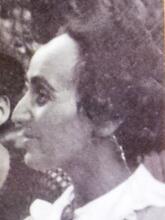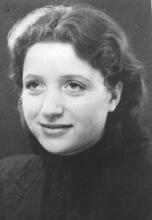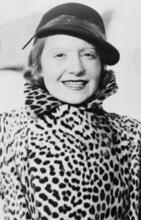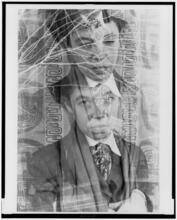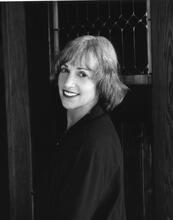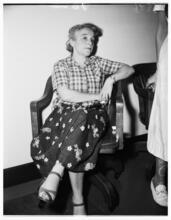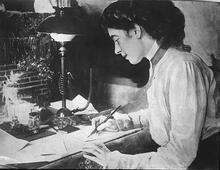Moroccan Jewish Women and Politics
Jewish women have been involved in Moroccan politics since at least the nineteenth century. Jews have lived in the region for centuries, long predating the European presence in the country beginning in the nineteenth century. These women resisted assimilation under Muslim rule, and later dealt with French colonialism throughout the nineteenth and twentieth centuries. This same colonialism brought European leftist parties to the country, which Moroccan Jewish women participated in alongside their male countrymen and tweaked for their own purposes. The involvement of Moroccan Jewish women in politics did not stop in this era, despite the mass exodus of Jews from Morocco in the 1950s and 1960s; Jewish women are still influential to the Moroccan political scene into the twenty-first century.
Introduction
The term “politics” can encapsulate many activities, including religious martyrdom, organizing on behalf of refugees, as well as more traditionally construed activism within political groups. Documented Jewish women’s activism in Morocco extends at least back to the nineteenth century. The Moroccan Jewish saint Lalla Soulika (also known as Sol Hachuel) was executed for her refusal to convert to Islam in the early nineteenth century, a political act commemorated in a painting by French orientalist artist Alfred Dehodencq. In Morocco, there were many Jewish “saints,” or tzadiqqim as they are referred to in Hebrew, most of whom were miracle-working holy men. Jews, and sometimes Muslims too, would visit the tombs of such holy figures in the hopes of gaining supernatural intervention to solve the problems in their lives, such as illness or infertility, as detailed in Issachar Ben Ami’s book Saint Veneration Among the Jews in Morocco. In a more peaceful vein, the Alliance Israélite Universelle, a Jewish philanthropic and educational organization founded in 1860 by French Jews, with schools across North Africa, the Middle East, and the Balkans, often served as a locus of Jewish women’s activism, as Frances Malino has demonstrated. Beginning in the twentieth century, Jewish women were documented members of numerous political parties, active in leftist groups in women’s sections. Figures like Hélène Cazes Benatar, the subject of a rich work by Susan Gilson Miller entitled Years of Glory: Nelly Benatar and the Pursuit of Justice in Wartime North Africa, came to prominence during the Second World War, helping European refugees in Morocco. Jewish women continue to be involved in Moroccan politics in the twenty-first century, as demonstrated by Maguy Kakon (born in 1953 in Marrakesh), the first Jewish woman to run for the Moroccan parliament.
Political Involvement in the Nineteenth Century

Execution of a Jewess in Tangiers, by Alfred Dehodencq, c. 1861, depicting the execution of Lalla Soulika (also known as Sol Hachuel) for refusing to convert to Islam. Via Wikimedia Commons.
According to folkloric accounts, Jews have lived in North Africa since the destruction of the first temple in the sixth century BCE. Certainly, historians can trace Jewish communities in the region to the Roman period. By 1945, approximately 250,000 Jews lived in Morocco, most of whom would depart for Israel, France, or the Americas in the 1950s and 1960s. Jews were diverse in Morocco, with communities ranging from the more rural, outlying Amazigh (Berber) towns to the communities clustered in the north of the country that had their roots in medieval Spain and fled to Morocco after the expulsion of Jews from Spain in 1492. The first political figure of this article, Lalla Soulika (or Sol Hachuel), hailed from the north of Morocco, where large numbers of Descendants of the Jews who lived in Spain and Portugal before the explusion of 1492; primarily Jews of N. Africa, Italy, the Middle East and the Balkans.Sephardic Jews had settled.
Lalla Soulika was born in 1817 in the Moroccan Mediterranean coastal city of Tangier. According to lore, she was famously beautiful and caught the eye of a Muslim prince, who wanted to marry her, but doing so would have required her conversion to Islam. In another version of the story, Soulika was forcibly converted to Islam but then sought to return to Judaism. In both stories, Soulika rejects Islam in favor of maintaining her Judaism, resulting in her beheading in Fez, where her tomb today stands as a site of pilgrimage. This act of refusal and rebellion, resulting in martyrdom, was indeed political, one of the most prominent political acts of a Jewish women in Moroccan history. The sultan of Morocco was, after all, the amir al-mu’minim, or “Commander of the Faithful,” and to defy him was to defy the religious-political undergirding of the Moroccan state itself. From this point onward, however, Moroccan Jewish women in political life would typically operate in much safer ways.

Alliance Israélite Universelle school in Fez, Morocco, 1940. Creative Commons.
The Alliance Israélite Universelle also provided political opportunities for Moroccan Jewish women, although that was not the organization’s intention. The Alliance was established to prepare Jews for citizenship in their home countries through education, albeit in the French language and with French geography and history taking a central role in the curriculum. The schools provided a minimal amount of Hebrew education and almost no instruction in local languages until later in the twentieth century. The Alliance’s missions included modernizing the place of Jewish women in society, reducing rates of child marriage, and preparing Jewish women to be proper mothers and citizens in society. Top female graduates of the Alliance went to Paris for teacher training before being sent back out to a school typically away from their home location. They brought the ideology of the Alliance with them wherever they landed, training Jewish girls to become modern Jewish women according to the French standards of the Alliance. Women educated in Alliance schools often became political actors in other domains, such as joining women’s sections of the Communist party or other groups. The Alliance education trained Jewish women (and men) in the ideals of French republicanism, encouraging (albeit inadvertently) political action through its emphasis on the rights and responsibilities of individuals in a society.
Twentieth-Century Political Involvement
With the advent of the French and Spanish protectorates (a form of colonial rule that supposedly supported a country’s development toward independence) over Morocco in 1912, industrial opportunities abounded. French and Spanish workers came to Morocco, and a major rural to urban migration occurred within Morocco as Moroccan workers converged on new major industrial centers like Casablanca. With this convergence of workers came a fusion of new political ideas and interactions. While colonial authorities did their utmost to prevent fraternization between Europeans and Moroccans, this policy was difficult to enforce in practice. Thus Moroccans joined leftist political parties imported from Europe and altered them to meet local Moroccan needs. Many of these parties, including the Communist party, had women’s sections.
While the vast majority of Moroccan Jews preferred to stay out of the political limelight and saw political activity as a liability, caught as they were between French and Spanish colonial authorities and the vast Muslim majority, for those who did engage politically, leftist groups were the most popular options. The Youth Communists branch was popular, organizing picnics and beach days, while branches of the Communists in Meknès and elsewhere held events to support the Republicans in the Spanish Civil War. Jewish women were part of all of these endeavors, albeit in smaller numbers than their husbands and brothers. For example, Incarnation Rogel came to Morocco from Spain via Algeria with her family at a young age; her mother sold horsemeat and political pamphlets on the docks of Casablanca. Incarnation herself was not born Jewish, but she converted to Judaism to marry Simon Lévy, a major operative in the Moroccan Communist Party during the country’s struggle for national liberation, achieved in 1956. Incarnation participated in propaganda distribution and hosted Communist party events. Fortunée Sultan, wife of the Moroccan Communist Party’s secretary general, Algerian Jew Léon René Sultan, also participated in Communist events, even after her husband’s death in 1945. Evelyne Serfaty, sister of the more famous Abraham Serfaty, was a stalwart leftist operative and was tortured for her connection to her brother in the 1970s.
Another prominent figure in Moroccan political life was Hélène Cazes Benatar, more commonly known as Nelly. Benatar was Morocco’s first native-born woman lawyer and spent the years of the Second World War advocating and organizing for the waves of Jewish refugees who entered Morocco. This work became more intense following the success of Operation Torch, the Allied liberation of North Africa and a major front in the Mediterranean theater of World War II, in the fall of 1942, when Benatar worked with the American occupying forces to arrange visas, work, travel, and liberation of refugees from the work camps across French North Africa. Benatar was active in Zionist circles as well. While never elected to political office, she interacted with politicians and military brass at a high level to secure the lives of refugees in Morocco.
Into the Twenty-First Century
Most Jews left Morocco during the 1950s and 1960s, in response to fears regarding the place of Jews in an independent Morocco and flares of violence and persecution that conflated Moroccan Jews with Zionism. Some remained, however, including the women most tightly connected to the Communist party, who believed that the newly independent Morocco could be a place of harmony for Jews and Muslims. Those with wealth were also more likely to remain.
Among those who remained were Maguy Kakon and her family. Kakon was born in Marrakesh in 1953 and lived in Morocco until she was eighteen, when she left to study law in Paris. She returned to Morocco after six months when she married architect Aimé Kakon. Now living in Casablanca, Maguy Kakon became very involved in social justice causes through organizations such as the American Women’s Club. She joined CorpsAfrica Morocco, through which she advocated for girls’ education and organized young graduates to help teach children in remote locations in Morocco. When the repressive political atmosphere that dominated King Hassan II’s rule lifted in the late 1990s and once her own children were grown, Kakon became involved in politics, joining the Parti du centre sociale (Center Social Party), which sought as its main platform to reduce inequality between rich and poor in Morocco. Kakon ran for parliament in 2007 and again in 2011; although she did not secure enough votes to win, she garnered significant international media attention as a Jewish woman leading a political party in a Muslim majority nation. In 2007, she joined the Human Rights Council in Morocco, where she still advocates for girls’ education. In addition to her political work, Kakon is a published author of a book about her parliamentary campaigns and two books about traditional Moroccan Jewish cooking.
Ben-Ami, Issachar. Saint Veneration Among the Jews of Morocco. Detroit: Wayne State University Press, 1998.
Heckman, Alma Rachel. The Sultan’s Communists: Moroccan Jews and the Politics of Belonging. Stanford: Stanford University Press, 2021.
Malino, Frances. “The Women Teachers of the Alliance Israélite Universelle 1872-1940.” In Jewish Women in Historical Perspective, edited by Judith Baskin, 248-269. 2nd ed. Detroit: Wayne State University Press, 1998.
Miller, Susan Gilson. Years of Glory: Nelly Benatar and the Pursuit of Justice in Wartime North Africa. Stanford: Stanford University Press, 2021.
Phone interview with Maguy Kakon, January 5, 2023.




